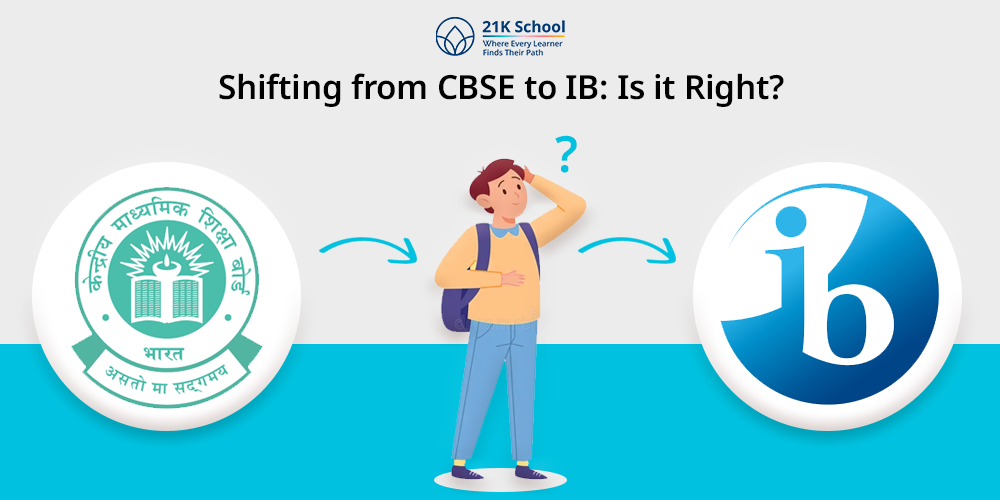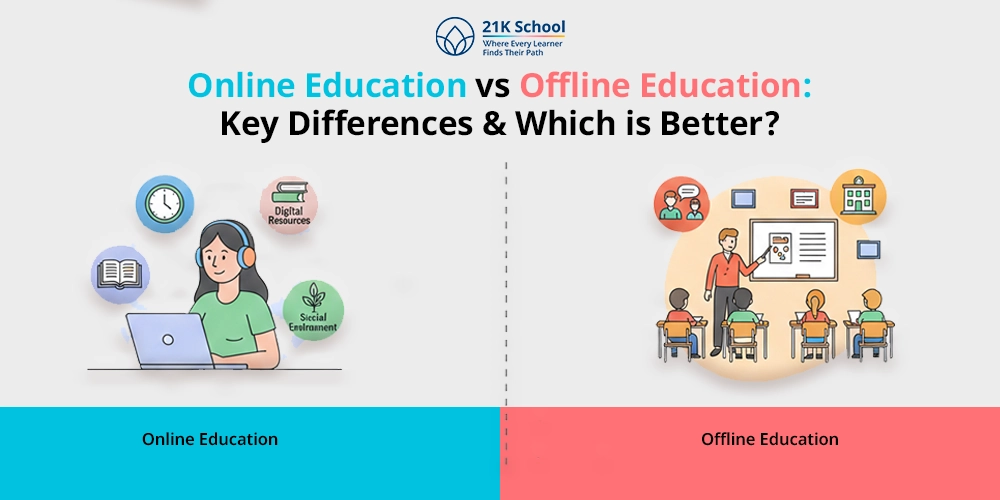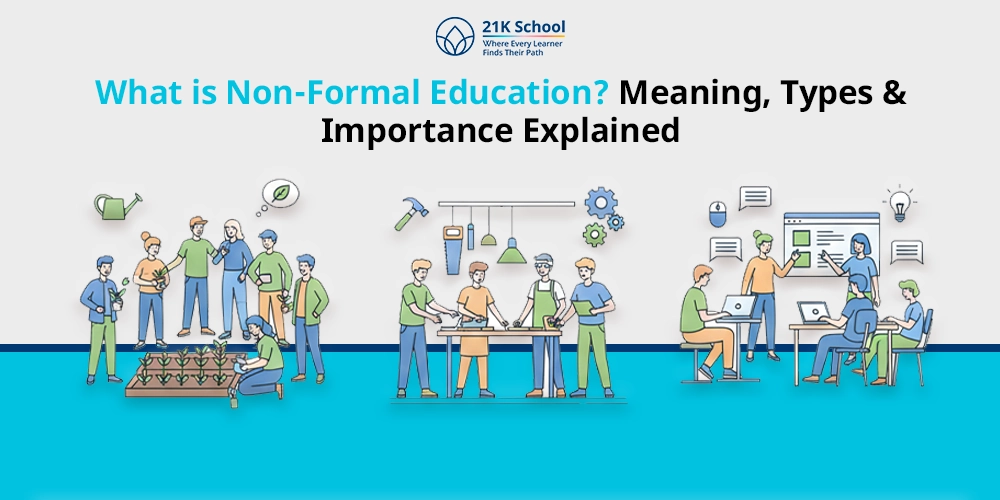
Education has now transformed. Isn’ t it? Today, it is more likely a one fit, one individual type. Each student operates to the best of his or her self-process.
It’s known that every organisation requires well-qualified and skills-based employees. And this is why, Indian parents are also opening up to modern types of education in big numbers.
What is among the biggest things being done in the same direction? Changing CBSE (Central Board of Secondary Education) to IB (International Baccalaureate) board.
So is it worth changing? How do you know it is good and right for your child?
To come out of this fix, in this blog we will show you everything you need to know about swapping between CBSE and IB. Moving ahead to show what both are, and what factors to bear in mind while switching.
Contents
What is CBSE Board?
Central Board of Secondary Education (CBSE) is a very famous Indian national education board. CBSE is a standard and well-organized governmental board of India. And it is academic oriented particularly the sciences and maths.
Key Features:
- It is NCERT based.
- Quality study of subject and theory.
- Grading system.
- Assists in training for very competitive exams (JEE, NEET).
- Liberal schools and colleges of India came to accept them.
What is IB Board?
Now let’s see in detail about the IB board. International Baccalaureate (IB) is a globally recognized learning system that helps children aged 3-19 to have their skills policed. It boasts of an infrastructural and inquiry-based curriculum which invites critical thinking skills into practical life.
IB consists of four programmes among junior high students. The most relevant ones are:
- Primary Years Programme (PYP),
- Middle Years Programme (MYP),
- Diploma Programme (DP), and
- Career related programmes (CP)
Key Features:
- They give an emphasis on holistic, and interdisciplinary learning.
- On going self-assessment and course-work.
- Generates inter-nationalism and the global village.
- Not hard-and-fast as to the choice of subjects.
- Accommodates social, personal, emotional and academic growth.
What to Consider Before Transferring out of CBSE into IB?
Such a move to IB from CBSE should look at a manifold number of reasons. Lack of looking up to them could be undesirable to learners. These include:
1. Scholastic ability and learning style
IB targets students that want conversation, conceptual, and inquiry-based learning . However, when your child is more artistic, adventurous and a problem-solving kind of a talent, then IB will suit him/her.
On the other hand, IB can be stressful to the students who are accustomed to a linear memorizing and exam type of learning at first.
2. Time and Work Management
In comparison to the direct academic scheme in the CBSE, IB challenges the students on how to balance their studies to other internal assessments such as projects, presentations and research.
Switching to the IB requires the best time-management skills to prevent burnout.
3. Career Educational Plans and Goals Future
In case you intend to apply in foreign universities, you would better be in IB which is more welcomed internationally. However, CBSE would be in a similar format to students who take admission into Indian competitive courses (that include the NEET and JEE).
4. Multiple Evaluation Support
CBSE only relies on the utilization of board tests to evaluate the learners. Nevertheless, IB boards are put in a harsh test consisting of projects, inner exams, viva and marking by the teacher.
Change means adjection to new forms of feedback, grading and academic requirements.
5. Money and logistical Measures
There is no doubt that IB schools are more expensive than CBSE because of global recognition and pedagogy. And to cap it all the IB schools are fewer.
Due to it, logistics and transfer is a bit complicated in other countries, particularly in smaller cities.
6. Transition Assistance Support System
Not every school helps with such a rite of transition support to that degree. Some positive orientation, counsellors and academic assistance will help a lot in settling them down in the new IB school.
7. Parents Involvement/Expectations
The universal feature of IB facilitated by reflective evaluations and project-based learning is parental involvement. It should be the parent who is informed about IB philosophy and helps her/his children in the long run, during their academic life.
Map of Switching CBSE to IB
IB sifting may disorient and frighten the new learners who would like to choose a competent profession. It is possible to complete them in skill-based education as follows.
- Research locally in your Neighborhood IB Schools: Just imagine the IB schools in your neighborhoods, and just attend school tours, or open houses.
- Academic Readiness Exam: There are IB schools who want them to pass an entrance-exam in order to be tested academically and morally.
- Documentation: Carry report cards, a transfer certificate, ID proof and a special needs assessment where it must be.
- The transition year plan: Where feasible, it is best to bring about the change at these transition years (i.e. Gr. 5 to Gr. 6, or 10 to 11) and minimise the upset.
- Orientation and Counselling: Use offered orientation sessions by the IB school to chart expectations and plan to change.
Advantages of CBSE to IB Switch
The change to the IB after CBSE has advantages, other than empowering the students in their careers. A section of these pros can be read below.
1. Real-based Learning
IB makes sure that a balanced person is made by combining life skills, creativity to academics and learning by service. Such programs as CAS (Creativity, Activity, Service) make sure that the students develop on social, emotional, and academic levels.
2. Global Opportunities
Around the globe, the best colleges accept IB Diploma and in the majority of cases, this qualification is valued in admission and financing. It fosters global attitudes and cultural awareness .
3. Provision of Critical Thinking
IB is depth oriented unlike breadth oriented. It fosters intellectual dialogue, writing and critical thinking via essay writing, discussion and research.
Practice some more critical thinking activities for kids , and let them excel individually.
4. Learning Flexibility
IB gives a student choice of courses according to subjects (language, sciences, humanities and art). It gives them the opportunity to develop their own learning styles . This makes academic life free to learn and query.
Difficulties in Moving to IB from CBSE
One of the challenges that students might have through transferring CBSE to the IB can be filled by relevant guidance. Look between the lines to read the said restrictions, so that you do not get frustrated and lose your way.
- Change of a New Teaching Style: Research and discussion mode of instruction may be a challenge to students accustomed to rote or test learning at the IB level.
- Time Management: IB work environment may be very time consuming due to the projects and continuous evaluation therein. Students should plan weekly and monthly assignments in order to have a balance of academics and co-curricular activities .
- Increased Workload: IB, at least in the Diploma, is more stressful. This stress on essays, theory and long essays is more deceptive to a first time learner.
Tips on easy change over to IB with CBSE
Prior to the move to IB learners should consider some few factors that will be ahead of them. The following are the suggestions that can ease the transition of CBSE to IB.
- Start Early: Train your kid with inquiry thinking and work into the project before becoming an official part of the IB system. Consider such aspects as IB related summer camp or MOOC or other learning provisions.
- Improve Skills: Write and research more effectively and make presentations. The latter will be notable in the assignments, long essays and in the classroom.
- Time Management: Employ planners and apps to create and schedule tasks and find the balance with co-curriculars. It should be promoted that short-reviewing daily can be good rather than cramming.
- Participate in After School Activity: IB experiences a sense of holistic development and this explains why it places emphasis on extra-curricular activities . To allow students to gain a balanced profile, they need to take part in art, sports, community services and leadership.
- Seek Support: Speak to mentors, tutors and counselors that know about the IB. The transition stress can also be relieved by peer support groups and involvement of parents.
To Wrap It Up
IB transition is not the matter of replacing books and classrooms, but the question of a new method of learning or not. The IB system looks harrowing at the first glance but very rewarding too.
The students are independent problem solving self-confident world citizens. The shift will however be progressively embraced. Identify what your child wants, what he likes and personality.
But, when delivered and done and in the right place, the IB journey will indeed wind up turning around.



